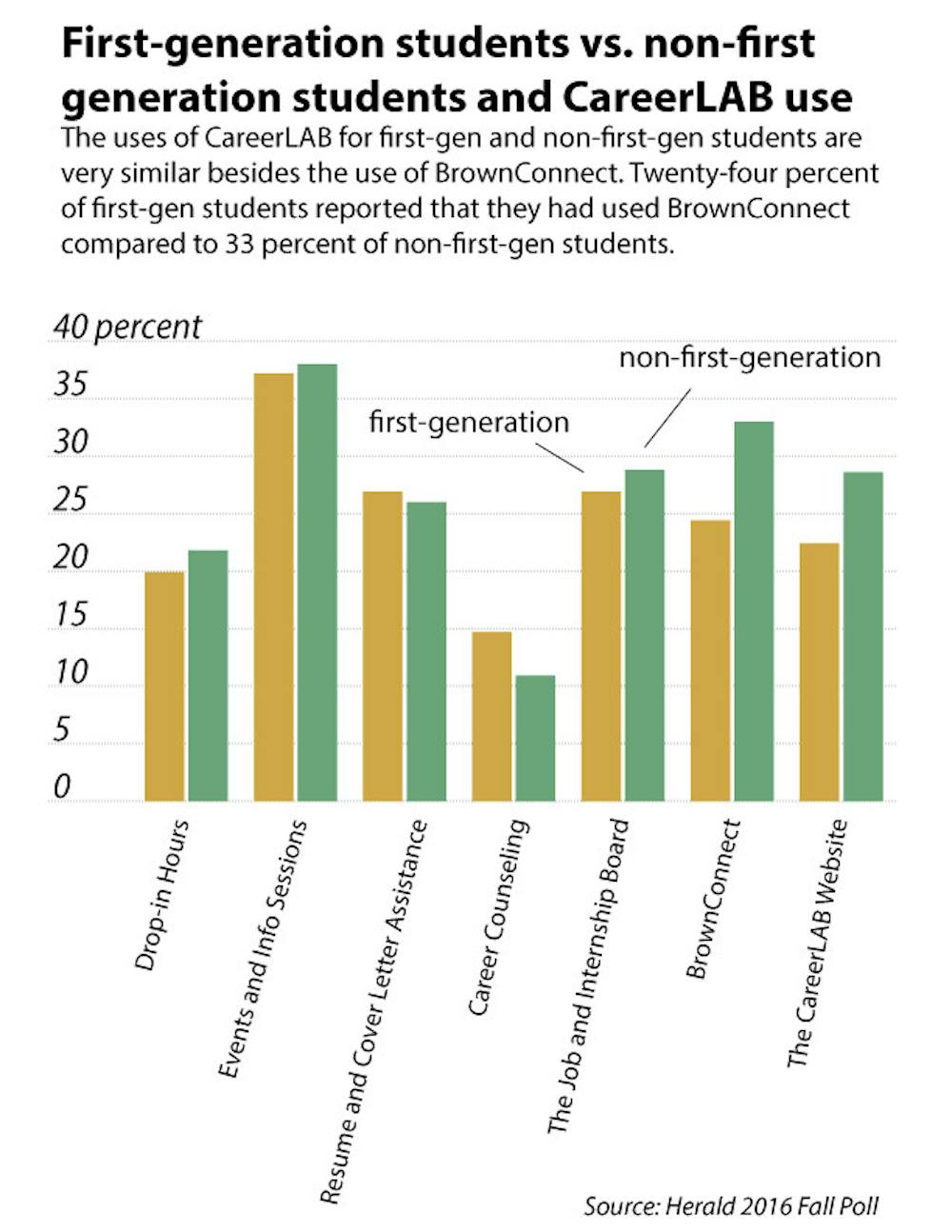According to results from The Herald’s 2016 fall poll, first-generation students at Brown are significantly less likely to use CareerLAB’s BrownConnect service than their non-first-gen peers. But CareerLAB has been collaborating with the First-Generation College and Low-Income Center to connect first-gen students with its resources, and CareerLAB statistics show the efforts are paying off.
BrownConnect, launched in November 2014, is an online tool created by CareerLAB that allows students to apply for jobs and internships and contact alums working in fields of interest to them. Of the first-gen students who responded to the Herald poll, 24.4 percent said they had used BrownConnect. Of the non-first-gen students, 33 percent reported using the service.
By contrast, a summer survey from CareerLAB found that approximately 50 percent of first-gen students used BrownConnect in their search for a job or internship — a proportion mirrored almost exactly in the rest of the student population, according to CareerLAB’s numbers. “The top five services (first-gen students) use match exactly the top five services that non-first-gen students use,” said Aixa Kidd, director of BrownConnect.
While the FLi Center has focused on getting its students to use the tools provided to them, “we haven’t necessarily within the first-gen community talked about BrownConnect versus CareerLAB,” said Yolanda Rome, co-director of the First-Generation College Student Program and assistant dean of the College for first-year and sophomore studies.
Some first-generation students may be intimidated by the process of networking through BrownConnect, several sources said. “We’re not used to the professional world, where everything works by connections,” said Angel Mendez-Flores ’20, a first-gen student from Los Angeles. He added that first-gen students often “can’t ask our parents for guidance or support” in the process of networking.
“I think it’s about intimidation,” Rome said. She added that the FLi Center is trying to frame the process of reaching out to alums as “building a relationship” instead of “networking,” because “networking can feel a little cold.”
Some first-gen students may find networking less intimidating when the alums who post jobs are also first-gen, Mendez said. “I think it would definitely be easier to reach out to first-gen alumni,” Mendez said.
CareerLAB identifies alums on BrownConnect who are interested in hiring first-gen students, but that doesn’t mean those alums were first-generation college students themselves. A coming update to the directory should help identify first-gen alums, and “once we do that, it may be a little bit more obvious to students who they might feel comfortable connecting with,” Rome said.
Matthew Donato, director of CareerLAB, understands the obstacles that some in the first-gen community face in the job search. As a first-generation student at Georgetown University, Donato recounted, “I didn’t know how to use a career office.” Some students may be hindered by “just not knowing what networking is,” he added.
CareerLAB has been working to help students overcome these barriers. “Close to 70 percent of the first-gen students at Brown engaged with us last year,” Donato said. “I would like that number to be over 90 percent.”
“The Peer Career Advisors have weekly hours over at the FLi Center because we realized we want to do better outreach to the first-gen community,” Kidd said.
Though Kidd and Donato are pleased with data from CareerLAB indicating that first-gen students and their peers are using career-oriented resources at comparable rates, they think there is still work to do. “We want to make sure that we’re making an impact,” Kidd said.
“If you’re a first-gen student, and you see peers at Brown who come from more privileged backgrounds or have family connections stretching back many years, you can think … ‘I don’t have access to that,’” Donato said. “So how do you get around that? Start using the network you’re part of, which is the Brown community.”





